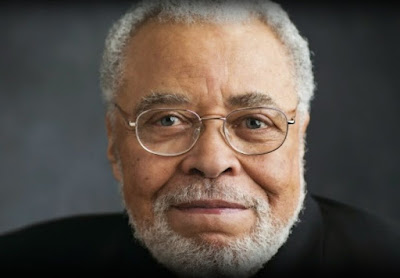Darth Vader’s introduction in “Star Wars” is so iconic that you hardly need me to provide a detailed explanation, but for the purposes of this post, let us say that it’s wordless. It’s a moment rendered entirely through aesthetic – costume, music, and the how the camera angle remains low to make him larger than life as he processes through the alley of fallen rebels. But that means when he finally does speak, his speaking voice has a lot to live up to. And it has even more to live up to given what he’s doing when he breaks his brief silence – that is, lifting a hapless rebel clean up off the ground by his throat. “Where are those transmissions you intercepted?” the Sith Lord demands, speaking of the plans for the vaunted Death Star. “What have you done with those plans?!” It’s the last word – “plans!” – which really resonates, figuratively splattering against the wall the way he splatters the hapless rebel against the wall after he snaps his throat. The voice, by the grace of James Earl Jones, meets the moment. As it does throughout the movie. My favorite line (reading) comes later, during the big Imperial morning meeting, the one where Admiral Motti is crowing about how the Death Star is the greatest thing since green milk and Vader says, “Don’t be too proud of this technological terror you’ve constructed.” Jones enunciates every word. Listen to it and you can practically see the bass notes moving on the speaker; he’s scaring you with elocution. That’s not easy.
When we talk about about seminal voices of the silver screen, who are we talking about? We’re talking about Humphrey Bogart delivering dry witticisms, of course, and we’re talking about Jean Harlow sassing everyone in sight, sure, and we’re talking about James Earl Jones saying, well, anything as Darth Vader. “No disintegrations!” he booms so suddenly at the bounty hunter in “The Empire Strikes Back” that it becomes the improbable vocal equivalent of Marty McFly strumming the first note on Doc’s giant amp and getting blown backwards. That’s what makes it at least partly astounding that for those first two “Star Wars” movies, at least, Jones did not even get a credit. But then, that was his own request. By his estimation, he worked no more than a couple hours on the first movie, brought in during post-production when the voice of English actor David Prowse, who was inside the Darth Vader costume, did not, unfortunately, meet all those moments. And Jones, ever noble, knew that Prowse was the one who sweated it out day after day inside that costume. Even so. I mean no disrespect to Prowse, whose own relationship to the role proved bitter and complicated over time, but as crucial as his own physical work was in bringing Darth Vader to life, Jones is living proof how much difference a voice can make. His voice fills up that costume, creates a character more machine than man. You see him – you see him – because of Jones. And when his face is revealed in “Return of the Jedi,” through no fault of Sebastian Shaw, the English actor chosen to be the one under the helmet, it’s inevitably disappointing. There was no way, none whatsoever, that Darth Vader could live up to the way James Earl Jones made him look in each one of our minds.
Jones, though, was not just Darth Vader. The Mississippi native was an immensely talented and versatile actor who got his start in the theatre, speaking to how he could physically live a role too. I never saw him on the stage, but My Beautiful, Perspicacious Wife, an avid theatergoer, did in London’s West End in “Driving Miss Daisy” circa 2011 and will testify to his brilliance. I can only imagine how his voice might have resonated in person. Despite the context surrounding his famed sermon in “Field of Dreams,” a black man praising a long prejudiced sport, his baritone rendered the game’s myth tangible. His voice could lend gravity to middling 90s thrillers, provide dignity to corporations in various commercials, and honor the Olympic Games. Reader, I confess, in that miserable Olympics-less summer of 2020 when the Tokyo games were postponed, I must have watched and/or listened to the monologue Jones delivered for NBC’s prelude to the 2000 Sydney Summer Olympics opening ceremony a hundred times. His concluding intonation to “let the games begin” was perfect. Unadorned, he just said the words, bearing witness to their meaning, and showcasing just how much spine-tingling power his natural, unembellished voice could imbue. Much as the voice of Bob Sheppard was still used to introduce Derek Jeter even after the longtime New York Yankees announcer passed, Jones should have been grandfathered in for American television to say “let the games begin” for eternity.
The voice of Jones was so potent that it could swing both ways. Much as “The Lion King” enlisted his one-of-a-kind verbal command to animate Musafa, or various Tom Clancy screen adaptations recruited him to inject authority as the CIA deputy director of intelligence, Phil Alden Robinson’s comic thriller “Sneakers” called upon Jones to project gravitas as the NSA director of operations. His character was forced to work with and then mollify a motley team of hackers making increasingly kooky demands for covert services rendered, like one essentially asking the US Government to buy the world a Coke, leaving Jones’s character dumbfounded, enraged, but grudgingly acquiescent. If it had been any other actor in the role, the moment would have been funny, but because it was Jones, it was funny and profound. You’ll never understand authority better than when one of the most authoritative actors loses all sense of it.
James Earl Jones died on Monday. He was 93.




No comments:
Post a Comment